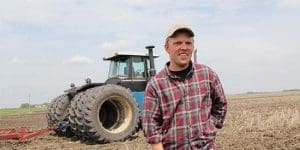
Farmers suffering workplace injuries need tailored rehabilitation solutions.
FARMERS should have access to tailored rehabilitation programs after serious workplace injuries, a first-of-its-kind study from Deakin University which has found their unique needs are being ignored.
The study, carried out in collaboration with Monash University, interviewed 31 Victorian farm workers who had experienced a serious injury on-farm between 2007 and 2013.
It found farmers’ unique workplace injury needs were being ignored and that many had been forced to sell their farms, lose months of income, or work through their injuries, due to a lack of support in their recovery process.
Lead author Jessica Beattie, a lecturer in Deakin’s School of Medicine, said this was the first qualitative study asking Australian farmers to recount the ramifications of serious workplace injury.
“Farm injury related research has often focused on the incidence of injury rather than farmers’ perspective of their recovery.
“But we know recovery from a serious injury is difficult, as is life on the land,” Ms Beattie said.
Australian farmers over-represented in injury statistics

Deakin lecturer Jessica Beattie.
Australian farmers are significantly over-represented in injury statistics compared to other occupations, and farm injuries account for 17 percent of all worker fatalities.
Injuries sustained by farmers interviewed in the Deakin study included major fractures, spinal injuries and head trauma, with most of the injuries sustained in quad bike accidents or livestock related incidents.
Ms Beattie said farmers were older compared to other Australian workers and often worked alone for longer hours.
“This places farmers at an increased risk of injury and then provides a unique set of challenges for their recovery.
“Once discharged from either a hospital or a rehabilitation setting, farmers are potentially returning to recover both at their place of work, and frequently where the injury occurred,” she said.
“The farmers we interviewed felt this had a negative impact on their recovery, with many describing they had no other option but to return to work before they were adequately recovered, putting themselves at increased risk of further injury and delaying the recovery process.
“Their reasons for returning to work, despite medical advice to the contrary, were because of the need to ensure farming production continued.”
Ms Beattie said it was clear that farmers needed support tailored to their unique work environment, and taking into account the fact many lived in rural and remote areas, far from rehabilitation services.
“We need to be providing health professionals with appropriate discharge practices for farm workers.
“So that might be about understanding that they will probably do some farm work on their return, but working out how they can do that in a way that’s going to still let them heal appropriately,” she said.
“Ultimately education and training for health professionals who care for farmers post injury needs to be enhanced so they can understand the realities of working and living on a farm.”
As part of addressing this need, the National Centre of Farmer Health – a collaboration between Deakin and the Western District Health Service – offers Australia’s only Graduate Certificate in Agricultural Health and Medicine to assist rural professionals to understand the unique health, wellbeing and safety demands of farming.
The course focuses on common injuries and illnesses in farming populations, including trauma, and since its inception in 2010 more than 135 students have taken part.
Ms Beattie said there also needed to be more education around the financial implications of farm injuries.
“Half of the workers in this industry are not covered by workers compensation because they are self-employed,” she said.
“That’s where personal income protection insurance should come in, but despite the benefits, many farmers remain uninsured as they feel it’s not a priority expense, especially during periods of economic uncertainty.
“The problem is that the health of the farm is often more of priority to them than their own health.”

The National Centre for Farmer Health would be an appropriate organisation to carry out this important role with rural and remote communities